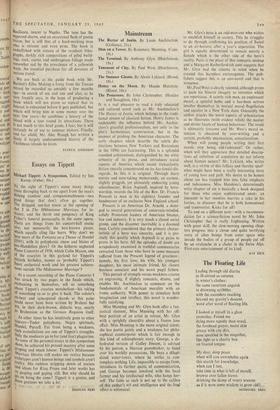Mainstream
The Terminal. By Anthony Glyn. (Hutchinson,
18s.) '
Honey on the Moon. By Maude Hutchins. (Blond, 18s.) IT is a real pleasure to read a truly educated and cultured novel such as Mr. Auchincloss's The Rector of Justin, which belongs to the tradi- tional stream of classical fiction. Henry James is undeniably the influence behind Mr. Auchin- closs's graceful professionalism, not only in the plot's harmonious construction, but in the manner of probing the American character. The early chapters which describe the subtle dis- tinctions between New; Yorkers and Bostonians in the 1890s are fascinating. This is a splendid rounded achievement, distinguished by the witty urbanity of its prose, and introduces social aspects of America which recent transatlantic fiction (mostly concentrated on les bas-fonds) dis- regards. In this it is original. Through diary entries and note-taking memoranda, an earnest, slightly priggish, yet ultimately endearing young schoolmaster, Brian Aspinall, inspired by hero- worship, records the life of the Rev. Dr. Francis Prescott (a man in his eighties), founder and headmaster of an exclusive New England school.
Prescott is an American Dr. Arnold, a demi- god to several generations of autocratic-minded, solidly Protestant leaders of American finance, law and industry. It is very much a closed social group, and the dissenter inevitably is a doomed man. Carlyle considered that the primary charac- teristic of a hero was sincerity, and it is pre- cisely this quality which Aspinall is at pains to prove in his hero. All the episodes of doubt are scrupulously examined in truthful commentaries extracted from those who have in some measure suffered from the 'Prescott legend of greatness: namely, his first love, his wife, his youngest daughter, his most intimate friend, his closest business associate and his worst pupil failure.
This pursuit of strength versus weakness creates an engrossing, if slightly romantic, drama, and enables Mr. Auchincloss to comment on the fundamentals of American morality with an ironic authority. With power to stimulate both imagination and intellect, this novel is wonder- fully satisfying.
Miss Manning and Mr. Glyn both offer a fan- tastical element, Miss Manning with her off- beat portrait of an artist in retreat, Mr. Glyn with a sprightly absurdity about a frozen love affair. Miss Manning is the more original talent; she has poetic gaiety and a weakness, for philo- sophical counterpoint which is fair enough in this kind of schizophrenic story. George, a de- hydrated version of Gulley Jimson, is advised by his patron, a Shavian pawnbroker, to hand over his worldly possessions. He buys a dilapi- dated water-tower, where he settles to con- template nothing. Life, impossible to escape from, introduces its further quota of communication, and George becomes involved with the local farmer and his intellectual wife, who hangs her- self. The fable as such is not up to the calibre of, this author's wit and intelligence and the final effect is whimsical. Mr. Glyn's hero is an odd-man-out who wishes to establish himself in society. This he struggles to do through confirming his position of fiancé to an air-hostess, after a year's separation. The girl is equally determined to remain merely a fiancée which is the other side of the hero's reality. Paris is the place of this romantic mishap and a Margaret Rutherford-ish aunt suggests that Mr. Glyn had the cinema in mind when he created this harmless extravaganza. The pub- lishers suggest this is an anti-novel and that is nonsense.
Mr.faul West is clearly talented, although prone to push his bizarre imagery to extremes which are repetitious. A saintly rich man, an unpleasant dwarf, a spiteful hobo and a has-been actress involve themselves in mutual moral flagellation and squalor in a New York slum. Ostensibly the author attacks the worst aspects of urbanisation as he illustrates (with evident relish) the nastier and dirtier facets of human behaviour. The result is ultimately tiresome and Mr. West's moral in- tention is obscured by over-writing and a certain, probably unconscious, sensationalism.
When will young people writing their first novels stop being old-fashioned? Or rather, when will they appreciate that detailed descrip- tions ad infinitum of copulation do not inform about human nature? Mr. Lykiard, who writes well, is a victim of this fallacy and thereby spoil- what might have been a really interesting story of young love and guilt. His desire to be honest about sex has trapped him into false emphasis and tediousness. Miss Hutehins's determinedly witty chapter of sin is basically a book designed for those who enjoy sophisticated smut: an innocent in her twenties marries a rake in his forties, to discover that he is both homosexual and transvestist. Kicks for all!
To end on a different note—with a recommen- dation for a science-fiction novel by Mr. John Christopher that is really frightening. Written with great skill, the slow-moving opening chap- ters progress into a clever and quite terrifying story of alien beings from outer space who invade the bodies of a group of people cut off by an avalanche in a chalet in the Swiss Alps. First-rate entertainment of its kind.
KAY DICK


































 Previous page
Previous page